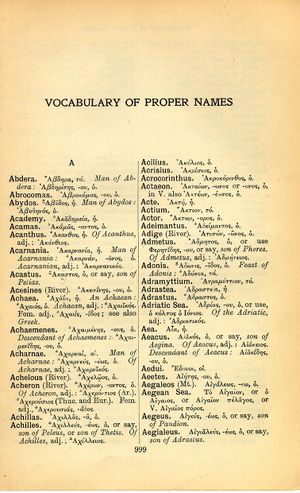Adonis
Ἱερὸν ἀληθῶς ἐστιν ἡ συμβουλία → Consilia dare, res prorsus et vere sacra est → Ein Heiligtum ist in der Tat ein guter Rat
English > Greek (Woodhouse)
Ἄδωνις, -ιδος, ὁ.
Feast of a Adonis: Ἀδώνια, τά.
Latin > English (Lewis & Short)
Ădōnis: nis or nĭdis, m., = Ἄδωνις> and Ἄδων> (nom. Adon, Venant. Carm. 7, 12 and 18;
I gen. Adonis, Plin. 19, 4, 19, § 49; dat. Adonidi, Cic. N. D. 3, 23; acc. Adonidem, Claud. Nupt. Hon. et Mar. 16: Adonim, Prop. 3, 5, 37, acc. to Müller, Adonem: Adonem, Serv. ad Verg. E. 10, 18; Arnob. 4, p. 184; voc. Adoni, Ov. Met. 10, 542; abl. Adone, App. M. 8, p. 213).
I A son of Cinyras, king of Cyprus, beloved by Venus on account of his extraordinary beauty; he was torn in pieces in the chase by a wild boar, which Mars (acc. to some, Diana) sent against him out of jealousy, but was changed by Venus to a flower, which bore the name Adonium, and was yearly bewailed by her on the anniversary of his death, Ov. M. 10, 503 sq.; Macr. S. 1, 21; Serv. ad Verg. E. 8, 37; cf. with 10, 18, and Adonia: Adonis horti, Gr. κῆποι Ἀδώνιδος, pots of lettuce and other plants, which blossom quick, but wither as soon, Plin. 19, 4, 19, § 49; cf. Böttig. Sab. 1, 264.—
II A name of the Sun-god among the Assyrians and Phœnicians, Macr. S. 1, 21.—
III A name of a fish, i. q. exocoetus, Plin. 9, 19, 34, § 70.

